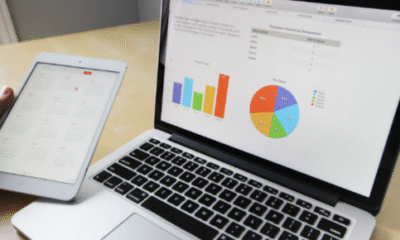Business
Ultimate Guide to GovGPT: Revolutionizing Government Contract Management
GovGPT, a cutting-edge AI-driven platform, is transforming government contract management by automating processes, enhancing transparency, and driving efficiency. This ultimate guide explores how GovGPT is revolutionizing government contract management and what you need to know to leverage its full potential.
What is GovGPT?
GovGPT is an AI-powered platform designed specifically to assist government agencies in managing contracts more effectively. By using technologies like natural language processing (NLP), machine learning, and data analytics, GovGPT automates and optimizes various aspects of contract management, from proposal evaluation to contract monitoring and compliance.
Key Features of GovGPT
- Automated Proposal Evaluation
- Speed and Accuracy: GovGPT can rapidly assess and score contract proposals based on predefined criteria, significantly reducing the time required for evaluation.
- Consistency: The AI ensures that evaluations are consistent and unbiased, minimizing human error and subjectivity.
- Enhanced Compliance Monitoring
- Real-Time Alerts: GovGPT continuously monitors contracts for compliance with regulations and standards, sending real-time alerts if any issues arise.
- Risk Mitigation: By identifying potential compliance risks early, GovGPT helps agencies take corrective actions before they escalate into bigger problems.
- Data-Driven Insights
- Historical Analysis: GovGPT analyzes past contract data to identify trends, benchmark performance, and provide actionable insights for future contracts.
- Predictive Analytics: The platform can predict potential risks or opportunities based on historical data and current market conditions, enabling proactive decision-making.
- Transparent and Auditable Processes
- Clear Documentation: Every action taken by GovGPT is documented, creating a transparent and auditable trail that enhances accountability.
- Fair Bidding Process: By automating bid evaluations and communications, GovGPT ensures that the bidding process is fair and transparent, reducing the potential for corruption.
- Streamlined Contract Management
- Milestone Tracking: GovGPT tracks project milestones, ensuring that contractors meet deadlines and deliverables.
- Budget Management: The AI can monitor expenditures in real-time, helping to prevent cost overruns and ensuring that projects stay within budget.
- Scalability and Flexibility
- Adaptable to Various Needs: Whether managing a single contract or a portfolio of contracts, GovGPT can scale to meet the needs of different government agencies.
- Customizable Workflows: Agencies can tailor GovGPT’s workflows to align with specific regulatory requirements and organizational processes.
How GovGPT is Revolutionizing Government Contract Management
- Efficiency Gains
- Reduced Manual Work: By automating repetitive tasks, GovGPT frees up government employees to focus on higher-level strategic work.
- Faster Decision-Making: Real-time data and analytics enable quicker and more informed decisions, accelerating the entire contract lifecycle.
- Cost Savings
- Reduced Administrative Costs: Automation reduces the need for extensive manual oversight, cutting down on labor costs.
- Minimized Risks and Penalties: Proactive compliance monitoring and risk management help avoid costly penalties and delays.
- Improved Contractor Relationships
- Transparent Communication: Automated and transparent processes foster better relationships with contractors by ensuring that expectations are clear and that feedback is timely.
- Performance Tracking: Continuous monitoring of contractor performance helps ensure that both parties meet their obligations, leading to more successful project outcomes.
- Enhanced Public Trust
- Accountability and Transparency: GovGPT’s transparent processes help build public trust in government contracting by reducing the risk of corruption and ensuring that public funds are used efficiently.
- Better Service Delivery: By improving the efficiency and effectiveness of contract management, GovGPT ultimately leads to better service delivery for citizens.
Challenges and Considerations
- Ethical Considerations
- Bias in AI Algorithms: Care must be taken to ensure that the algorithms used in GovGPT are free from bias, as biased decision-making can lead to unfair outcomes.
- Data Privacy: Protecting sensitive information is crucial, and GovGPT must be designed with robust data privacy measures.
- Security Concerns
- Cybersecurity: As with any digital platform, cybersecurity is a major concern. Ensuring that GovGPT is protected from cyber threats is essential to maintaining the integrity of government contracts.
- Data Integrity: Safeguarding the accuracy and integrity of the data used by GovGPT is critical to ensuring that its recommendations and actions are reliable.
- Implementation and Adoption
- Change Management: Government agencies may need to invest in training and change SAM. gov efforts to ensure that employees are comfortable using GovGPT.
- Integration with Existing Systems: Integrating GovGPT with existing contract management systems and processes can be complex and may require careful planning and execution.
Best Practices for Implementing GovGPT
- Start with a Pilot Program
- Begin by implementing GovGPT on a small scale to test its effectiveness and identify any challenges before rolling it out more broadly.
- Invest in Training
- Provide comprehensive training to employees and contractors to ensure they understand how to use GovGPT effectively.
- Regularly Review and Update AI Models
- Continuously monitor the performance of the AI models used in GovGPT and update them as necessary to ensure they remain accurate and unbiased.
- Ensure Strong Cybersecurity Measures
- Implement robust cybersecurity protocols to protect against data breaches and other cyber threats.
- Maintain Open Communication
- Keep lines of communication open between government agencies, contractors, and the public to ensure transparency and build trust in the new system.
The Future of GovGPT
As AI technology continues to evolve, GovGPT is expected to become even more sophisticated, offering new features and capabilities that further enhance government contract management. Future developments may include more advanced predictive analytics, greater automation of complex tasks, and deeper integration with other government systems.
By embracing GovGPT, government agencies can significantly improve the efficiency, transparency, and effectiveness of their contract management processes, ultimately leading to better outcomes for the public they serve.



















You must be logged in to post a comment Login